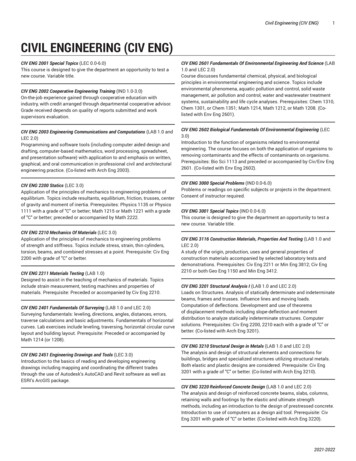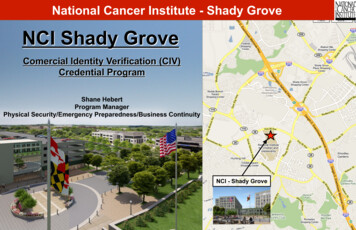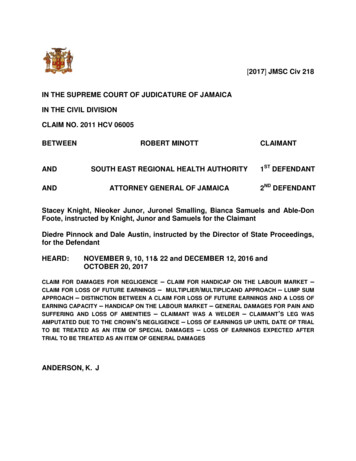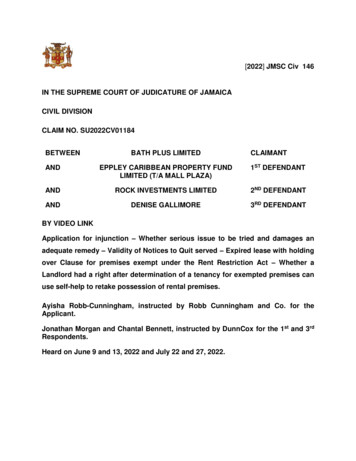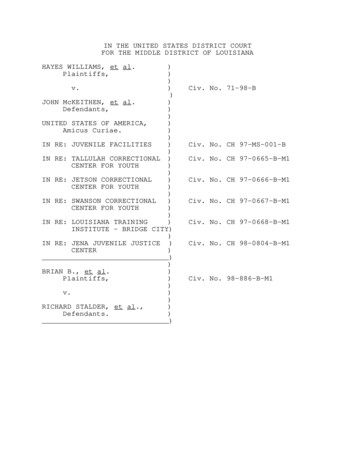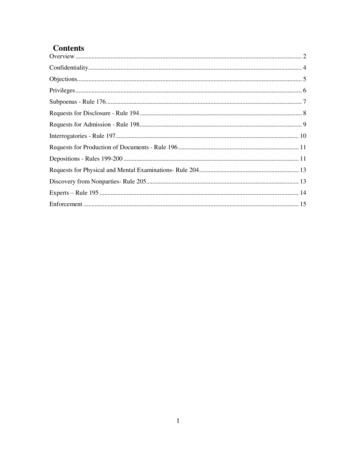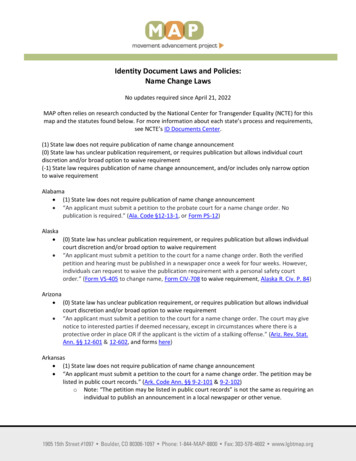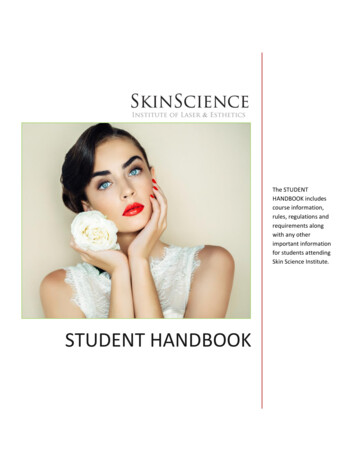![[2020] JMSC Civ 37 IN THE SUPREME COURT OF JUDICATURE OF JAMAICA IN THE .](/img/22/neil-2c-20george-20v-20the-20attorney-20general-20of-20jamaica-2c-20office-20of-20the-20utilities-20.jpg)
Transcription
[2020] JMSC Civ 37IN THE SUPREME COURT OF JUDICATURE OF JAMAICAIN THE CIVIL DIVISIONCLAIM NO. 2015HCV05030BETWEENGEORGE NEILCLAIMANTANDTHE ATTORNEY GENERAL OF JAMAICA1ST DEFENDANT/APPLICANTANDOFFICE OF UTILITIES REGULATION2ND DEFENDANTANDSPECTRUM MANAGEMENT AUTHORITY3RD DEFENDANTIN CHAMBERSMs. Althea Jarrett, Deputy Solicitor General and Ms. Apryl July instructed by theDirector of State Proceedings for the 1st defendant/ applicant.Ms. Kaydian Wood for the 3rd defendant.Mrs. Kaydian Smith-Newton, Legal Officer, Ministry of Science Energy and Technologypresent.8 January and 6 March 2020Claim of Public Interest Immunity – Duty of the court to balance competing aspects of thepublic interest in the administration of justice versus limiting disclosure to preservenational security – Minister’s Certificate should be given significant weight but is notconclusive – Three stage test to determine effectiveness of Certificate, relevance ofdocuments sought to be withheld and whether documents if relevant should not bedisclosed to avoid substantial harm to the public interest
-2D. FRASER JTHE APPLICATION[1]On 23 October 2019, the 1st defendant filed an ex parte application seeking,amongst others, the following court orders, that:(1)The defendant be permitted not to disclose the existence of letter datedFebruary 18, 2003 from the then Minister of National Security Peter Phillips tothe then Minister of Commerce and Technology Phillip Paulwell. [During thehearing of the application, it was conceded that the existence of the letter wasalready disclosed by the 2nd defendant in its list of documents filed on October11, 2019. Thus, counsel stated that the application was being amended for thedefendant to be permitted to withhold disclosure of the letter or at least towithhold disclosure of bullet point 2 of that letter.]; and(2)The defendants be permitted not to disclose the names and signatures of theauthors of the following documents: (a) Letter dated June 16, 2014 from the Jamaica Constabulary Force to theOffice of Utilities Regulations.(b) Letter dated January 2, 2015 from the National Intelligence Bureau tothe Office of Utilities Regulations.(c) Letter dated January 21, 2015 from the National Intelligence Bureau tothe Office of Utilities Regulations.(d) Letter dated April 17, 2015, from the National Intelligence Bureau to theOffice of Utilities Regulations.(e) Letter dated February 28, 2017 from the Office of Utilities Regulationsto the Commissioner of Police.
-3(f) Letter dated March 28, 2017 from the Jamaica Constabulary Force tothe Office of Utilities Regulations.(g) Letter dated April 4, 2017 from the Jamaica Constabulary Force to theOffice of Utilities Regulations.(h) Letter dated March 27, 2017 from National Intelligence Bureau to theDeputy Commissioner of Police.[2]The grounds on which the orders were sought may be summarised as follows:i) By virtue of rule 28.15(2) of the Civil Procedure Rules (CPR) the AttorneyGeneral was exercising her right and duty to seek the court’s permission, exparte, not to disclose certain information on the basis that such disclosurewould damage the public interest;ii) The correspondence from the Jamaica Constabulary Force (JCF), particularlythe National Intelligence Bureau contains sensitive national intelligencefindings in relation to the claimant and it was feared that disclosure of thenames and signatures of the members of the JCF signing to those findings,would put their lives and that of their family members in danger; andiii) The aforesaid letter dated February 18, 2003 contained secret and confidentialmatters involving the national security of Jamaica that in the public interestshould not be disclosed.[3]The application was supported by affidavits of Marlene Aldred, Solicitor Generaland Maria Myers-Hamilton, Managing Director of the Spectrum ManagementAuthority.
-4THE SUBMISSIONS[4]In support of the application, counsel made the following submissions, that:(1)Given the 1st defendant’s role as guardian of the public interest the AttorneyGeneral has the duty and the right to bring this application in light of what isaccepted as the Attorney General’s unique responsibility in this area of thelaw. (See R v Chief Constable of West Midlands Police Ex parte Wiley[1995] 1 AC 274 per Lord Bridge of Harwich at page 287 and Disclosure 5thEd. by Paul Matthews and Hodge M Malek Q.C para.12.18);(2)A person may object to the disclosure or inspection of a document, a class ofdocuments or part of a document on the ground of public interest immunity. Itinvolves the balancing of two competing aspects of the public interest – a) thepublic interest in the proper administration of justice by making all relevantmaterials available to all parties to litigation; and, b) the public interest inwithholding and not releasing information which could be harmful to the Stateand the public service if disclosed. (See Al Rawi and others v SecurityServices and others [2012] 1 All ER 1 at paras. 140 to 143 per Lord ClarkeSCJ and R v Chief Constable of West Midlands Police Ex p. Wiley, supra,(pp. 296 and 298);(3)The threshold test for when public interest immunity may be claimed is whetherthe disclosure will cause ‘substantial harm’ to the public interest. (R. v ChiefConstable Ex p. Wiley, supra, (p. 281);(4)The Minister’s Certificate is not conclusive and it is for the court to perform thebalancing exercise and make a final determination on whether a claim forpublic interest immunity is to be upheld. (See R v Chief Constable Ex p.Wiley, supra, (p. 296 -297);(5)In Disclosure 5th Ed. by Paul Matthews and Hodge M Malek Q.C, the learnedauthors identify national security as a category of public interest immunity;
-5(6)The application by the 1st defendant for this court to uphold the Minister’s claimof public interest immunity in withholding the names and signatures of themembers of the JCF who signed the letters/intelligence reports listed at items(a) to (h) of the notice of application is well founded, meritorious and supportedby authority;(7)There is no request to have the designations removed, only the names of theJCF members. Further, given that the identities of the large number of officersfrom various arms of the JCF involved in preparing the reports have not beendisclosed, it is reasonable to seek to protect the senior officers who were thesignatories to the letters/intelligence reports and who in any event would notnecessarily have themselves been involved in the investigations;(8)The just determination of the claimant’s claim for constitutional redress doesnot necessitate the disclosure of the names and signatures of the JCFmembers who signed the letters/intelligence reports;(9)While the Minister did not explicitly say that the disclosure of the letter ofFebruary 18, 2003 would harm the public interest, he did say that it is a secretand confidential letter containing secret and confidential matters involving thenational security of Jamaica. The fact that the letter is so described, issufficient to enable the court to place significant weight on the Minister’scertification that it is in the public interest that disclosure be withheld for sucha secret and confidential letter. There is value in the long line of authorities inplacing some weight on a ministerial certification that it is private, confidentialand relates to national security;(10) The court is invited to adopt the following three stage process outlined inDisclosure 5th Ed. by Paul Matthews and Hodge M Malek Q.C page 415 atpara. 12.21; and(11) The court is further invited to view the documents in making theaforementioned determinations and to rely on the dicta of Lord Clarke in Al
-6Rawi, supra, at para. 145(iii) and the case of Major General AntonyAnderson, Chief of Defence Staff, Jamaica Defence Board v IndependentCommission of Investigations [2018] JMFC Full 4 (see para. 176).ANALYSIS[5]Rule 28.15 of the CPR governs the procedure to be adopted when a claim of rightto withhold disclosure or inspection of a document is to be made. Paragraphs 1, 2,3, 6 and 7 provide:(1)A person who claims a right to withhold disclosure or inspection ofa document, class of document or part of a document must –(a)make such claim for the document; and(b)state the grounds on which such right is claimed, in the listor otherwise in writing to the person wishing to inspect thedocument.(2)A person may however apply to the court, without notice, for anorder permitting that person not to disclose the existence of adocument on the ground that disclosure of the existence of thedocument would damage the public interest(3)A person who applies under paragraph (2) must –(a)identify the document, documents or parts of documents forwhich a right to withhold disclosure is claimed; and(b)give evidence on affidavit showing –(i)that the applicant has a right or duty to withholddisclosure; and(ii)the grounds on which such right or duty is claimed.(4) (5).(6)On hearing such an application the court must make an order thatthe document be disclosed unless it is satisfied that there is a rightto withhold disclosure.
-7(7)(8)[6]Where a person –(a)claims a right to withhold inspection; or(b)applies for an order permitting that person not to disclosethe existence of, a document or part of a document, thecourt may require the person to produce that document tothe court to enable it to decide whether the claim is justified. I accept that as guardian of the public interest the 1st defendant has the duty andthe right to make this application. (See R v Chief Constable of West MidlandsPolice ex parte Wiley [1995] 1 AC 274 per Lord Bridge of Harwich at page 287and Disclosure 5th Ed. by Paul Matthews and Hodge M Malek Q.C para.12.18).It is also self-evident that it was appropriate to make this application ex parte as itspurpose would be automatically defeated if the hearing was inter-partes.[7]Public interest immunity is a ground for refusing to disclose a document which isrelevant and material to the determination of issues involved in civil or criminalproceedings. A claim to public interest immunity can only be justified if the publicinterest in preserving the confidentiality of the document outweighs the publicinterest in securing justice. (Per Lord Templeman in R v Chief Constable Ex p.Wiley at p. 280).[8]Paul Matthews and Hodge M Malek Q.C. learned authors of Disclosure 5th Ed.state at page 415 para. 12.26 that:A document may attract public interest immunity where it containsinformation relating to a method or technique in current or futureoperations, or the identity or appearance of current or former members ofthe security and intelligence services, so that disclosure could put theindividual in danger or impair his ability to operate efficiently.[9]The affidavit of the learned Solicitor General exhibited the Certificate of the Ministerof National Security dated 17th October 2019 which provided the substantivegrounds on which the orders were sought. In the Certificate he states that afterreviewing the letters, which now form the subject matter of this application, he
-8concluded that the names and signatures of the authors of the letters referred toat paragraph [1] (2) (a) – (h) and the letter dated February 18, 2003 referred to atparagraph [1] (1) should not be disclosed on the basis of public interest immunity.The basis of his conclusion in relation to the names and signatures was fear forthe lives of the signing officers and their families due to the sensitive nationalintelligence findings contained in the letters. The basis of his conclusion in relationto the letter of February 18, 2003 was that it was a secret and confidential lettercontaining secret and confidential matters involving the national security ofJamaica.[10]In the affidavit of Maria Myers-Hamilton it was indicated that all Domestic MobileSpectrum Licences issued are “generally subject to terms and conditions imposedby or under the spectrum licence, any provision of the Act, [TelecommunicationsAct, 2000], any regulations made thereunder and to the Laws of Jamaica.” Heraffidavit also stated that “The Telecommunications Act imposes an obligation ofsecrecy with respect to “all confidential information relating to applicants andapplications for spectrum licences, and the management and operation ofspectrum licensees”.” The significance of this affidavit, is that it showed that noneof the information sought to be withheld from disclosure in relation to the letter ofFebruary 18, 2003, would be evident on the face of any licence granted.[11]The leading authorities in this area make it clear that while the courts should anddo show due regard to the determination of the executive when a claim for PublicInterest Immunity (PII) is made, it is the court which has the final responsibility todetermine whether that claim should be upheld. (See R v Chief Constable Ex p.Wiley p. 296 and Al Rawi and others v Security Services and others para. 142).In some circumstances such as in Balfour v Foreign and Commonwealth Office[1994] 2 All E R 588 where the appropriate certificate of the Minister had set outparticulars of the nature and content of the material attracting immunity and thereasons for the claim that demonstrated an actual or potential risk to nationalsecurity, the court effectively treated the certificate as conclusive. In the instantcase whilst the Certificate issued by the Minister of National Security should be
-9accorded significant weight and a court should not lightly decline to honour itsimport, it is not conclusive of the question of immunity from disclosure. That hasbeen readily acknowledged by the applicant, which, in light of the guidance offeredby the authorities, has invited the court to view the documents to make theappropriate determination.[12]It should be bourne in mind at this point, that in applications claiming PII, it is notthat there is a conflict between two different public interests. Rather the court isengaged in balancing two different aspects of the public interest: one which reflectsthe requirements of the administration of justice and the other national securityaspect of the interest which militates against disclosure. In instances where thelatter aspect outweighs the former, then it is inevitable that the preservation of thedocument should follow so as to protect what has been held to be the dominantpublic interest. Where the determination is made in the reverse, then it is the publicinterest which requires disclosure. In the regard I adopt the observations of LordWoolf in R v Chief Constable Ex p. Wiley at p. 298.[13]Though in Al Rawi and others v Security Services and others Lord Clarkeended up in the minority in the outcome of the appeal, his summary of the law asit relates to PII is clear and accurate and provides the court with a roadmap to theresolution of this application. At paragraphs 144 – 145 he stated:[144] It is common ground that the current state of the law on what is nowcalled PII is set out in R v Chief Constable of West Midlands Police, exparte Wiley [1995] 1 AC 274. In that case, the House of Lords held thatthere was no justification for a claim for immunity for the entire class ofdocuments generated by an investigation into a complaint against thepolice.[145] I would accept the submission made by Ms Rose that the followingprinciples correctly state the approach to PII as it has stood until now:“i) A claim for PII must ordinarily be supported by a certificate signed by theappropriate minister relating to the individual documents inquestion: Duncan v Cammell Laird per Viscount Simon at p 638.
- 10 ii) Disclosure of documents which ought otherwise to be disclosed underCPR Part 31 may only be refused if the court concludes that the publicinterest which demands that the evidence be withheld outweighs the publicinterest in the administration of justice.iii) In making that decision, the court may inspect the documents: ScienceResearch Council v Nassé at pp 1089-1090. This must necessarily be donein an ex parte process from which the party seeking disclosure mayproperly be excluded. Otherwise the very purpose of the application for PIIwould be defeated: see the Court of Appeal judgment at para 40.iv) In making its decision, the court should consider what safeguards maybe imposed to permit the disclosure of the material. These might include,for example, holding all or part of the hearing in camera; requiring expressundertakings of confidentiality from those to whom documents aredisclosed; restricting the number of copies of a document that could betaken, or the circumstances in which documents could be inspected (egrequiring the Claimant and his legal team to attend at a particular locationto read sensitive material); or requiring the unique numbering of any copyof a sensitive document.v) Even where a complete document cannot be disclosed it may bepossible to produce relevant extracts, or to summarise the relevant effectof the material: Wiley at pp 306H-307B.vi) If the public interest in withholding the evidence does not outweigh thepublic interest in the administration of justice, the document must bedisclosed unless the party who has possession of the document concedesthe issue to which it relates: see Secretary of State for the HomeDepartment v MB [2007] UKHL 46, [2008] AC 440 per Lord Hoffmann atpara 51.”The Three Stage Test[14]The three stage process outlined in Disclosure 5th Ed. by Paul Matthews andHodge M Malek Q.C at para. 12.21, based on dicta from Bingham J as he thenwas in Air Canada v Secretary of State for Trade No. 2 [1983] 1 All E.R. 161 at165 -166, commends itself to the court. It requires that in considering whether PIIapplies a judge should:-
- 11 (1)satisfy himself from the certificate/affidavit/witness that:(a)(2)(3)the class of documents concerned is capable of attractingthe immunity;(b)there is no reason to believe that the actual documents donot fall within the class aimed; and(c)both the documents and the claim have been properlyconsidered by an appropriate person;determining whether there is a public interest in production byreason of both:(a)relevance to matters in question, and(b)necessity for disposing fairly of the case;balancing the public interest in withholding the document againstthe public interest in producing them.The Letters/ Intelligence Reports[15]The Minister’s Certificate indicates that his basis for claiming public interestimmunity in respect of the identity of the signatories to these letters is that theycontain sensitive national intelligence findings in relation to the claimant and it isfeared that disclosure of the identities of the members of the JCF signing to thosefindings would put their lives and the lives of their family members in danger. Fromthose assertions it is clear to the court that, though he did not use the particularphrase the Minister was of the view that the identity disclosure if not prevented,would cause “substantial harm to the public interest”, which is the test for a findingof PII.[16]I have reviewed the letters/intelligence reports. They do indeed contain sensitivenational intelligence findings in relation to the claimant and related interests. I amsatisfied from the Ministerial Certificate that these letters/intelligence reports arecapable of attracting PII and that the Minister has properly considered them andthe claim in which disclosure is sought to be withheld.
- 12 [17]The next consideration for the court is therefore whether there is public interest inthe production of the documents by reason of relevance and the necessity fordisposing fairly of the claim. These letters/intelligence reports are clearly relevantgiven that they form the foundation of the designation that is at the fulcrum of theconstitutional challenge brought by the claimant. However this application isspecific to seeking leave to withhold disclosure of the identities of the signatoriesand not the documents themselves. So the question at this stage is really narrowedto whether the identities of the signatories is relevant to the claim, it beingacknowledged that the contents of the documents themselves are.[18]My ruling on this second stage of the process is necessarily cautious as the fullextent and details of the case being advanced by the claimant will not be knownuntil all the evidence is filed for the hearing; a process which is obviously not yetcomplete. However, the court notes that the claimant’s claim is for constitutionalredress in the form of damages and declarations on the basis that the designationthat he is “a person with an adverse trace” is a breach of his constitutional right tofreedom of association guaranteed under section 13(3) (e) of the Constitution andhis right under section 13(3)(h) to equitable and humane treatment by any publicauthority in the exercise of their functions.[19]Based on the pleadings and other information available to the court at this time, Iagree with the submission of the applicant that the just determination of the claimdoes not require the disclosure of the names and signatures of the JCF memberswho signed the letters/intelligence reports. The question seems to be whether byascribing that designation to the claimant based on intelligence, it has resulted ina breach of the claimant’s constitutional rights as indicated. If this conclusion iscorrect then there would be no need to balance any competing aspect of the publicinterest as there would be no public interest in the disclosure of the identities.[20]In the event that the nature of the claim turns out to be such that a plausibleargument can be made that the identities of the signatories have some relevance,I will go on to consider the third aspect of the process: balancing of the different
- 13 aspects of the public interest that would then arise. As the contents of the reportsthemselves are not sought to be withheld, it will be observed by those who perusethem that not all the information they contain nor is every report adverse. Howeverin respect of all the letters I find that the fear that disclosure of the identity of themembers of the JCF who signed to those findings could place the lives of thoseofficers and their family members in danger is a legitimate one. This is not a casewhere as contemplated by Al Rawi and others v Security Services and others,“safeguards may be imposed to permit the disclosure” of the identities. I wish tostress that this finding is not because the court has formed a view one way oranother as to the cogency of the information in the various reports as it relates tothe claimant.[21]My finding is based on the fact that the nature of the work of the intelligenceservices is such that, if the identities of the officers within those services aredisclosed, in the words of Paul Matthews and Hodge M. Malek Q.C. the learnedauthors of Disclosure 5th Ed. cited earlier, “that disclosure could put the individualin danger or impair his ability to operate effectively.” The concern is therefore ofgeneral application as a recognised occupational hazard and is not specificallyrelated to, or to be taken as a commentary on the claimant in particular. It alsorequires no great stretch of principle to appreciate that the fear quite legitimatelycan extend to the family members of such JCF members. In the context of thatrecognised occupational hazard, it is clear to me that if disclosure of the identitiesof the signatories to those letters/intelligence reports is not withheld, substantialharm to national security would result. Therefore the aspect of the public interestthat should prevail is that related to national security.The Letter of February 18, 2003[22]The application as now framed is for the defendant to be permitted to withholddisclosure of this letter or at least to withhold disclosure of bullet point 2 of thatletter.
- 14 [23]I have reviewed the letter. It is labelled as “SECRET” and relates to nationalsecurity considerations being shared by the Minister of National Security with acolleague Minister who had responsibility for telecommunications. In R v ChiefConstable of West Midlands Ex p. Wiley Lord Templeman stated at page 281that “As a general rule the harm to the public interest of the disclosure of whole orpart of a document dealing with defence or national security or diplomatic secretswill be self-evident.” I am satisfied from the Ministerial Certificate that this letter iscapable of attracting PII and that the Minister has properly considered it and theclaim in which disclosure is sought to be withheld.[24]It does appear that some aspects of the letter may be relevant to the claim in termsof being supportive or explanatory of some of the actions of the authorities inrelation to the claimant. To that extent the need for the balancing act betweendifferent aspects of the public interest does arise. I do not however consider thatthe entire letter needs to be withheld from disclosure as the information it contains,apart from that in bullet point two, though sensitive, reflects a common senseapproach to the issues raised and at this point is already in the public domain.[25]In relation to bullet point two, it contains general information which I do not find tobe relevant to the claim. Further even if it was, apart from the general statementjust quoted from Ex p. Wiley, I would again rely on an extract from Disclosure 5thEd. at page 415 para 12.26 cited earlier, where it is stated in relation to nationalsecurity that, “A document may attract public interest immunity where it containsinformation relating to a method or technique in current or future operations. Thatis precisely the information that is captured in the second bullet point. Thereforefor the reasons that the information in bullet point two is not relevant to the claimand if it was disclosed substantial harm to national security would result, I amimpelled to hold that disclosure of bullet point two of this letter should be withheld.
- 15 DISPOSITION:[26]In the premises the court makes the following orders:(1)The defendants are permitted to withhold disclosure of the names andsignatures of the authors of the following documents:(i)Letter dated June 16, 2014 from the Jamaica Constabulary Force to theOffice of Utilities Regulations.(ii)Letter dated January 2, 2015 from the National Intelligence Bureau to theOffice of Utilities Regulations.(iii)Letter dated January 21, 2015 from the National Intelligence Bureau tothe Office of Utilities Regulations.(iv) Letter dated April 17, 2015, from the National Intelligence Bureau to theOffice of Utilities Regulations.(v)Letter dated February 28, 2017 from the Office of Utilities Regulations tothe Commissioner of Police.(vi) Letter dated March 28, 2017 from the Jamaica Constabulary Force to theOffice of Utilities Regulations.(vii) Letter dated April 4, 2017 from the Jamaica Constabulary Force to theOffice of Utilities Regulations.(viii) Letter dated March 27, 2017 from National Intelligence Bureau to theDeputy Commissioner of Police.(2)The defendants are permitted to withhold disclosure of the informationcontained in the second bullet point in the letter dated February 18, 2003 fromthe then Minister of National Security Dr. Peter Phillips to the then Minister ofCommerce and Technology Mr. Phillip Paulwell.
BETWEEN GEORGE NEIL CLAIMANT AND THE ATTORNEY GENERAL OF JAMAICA 1ST DEFENDANT/ APPLICANT AND OFFICE OF UTILITIES REGULATION 2ND DEFENDANT AND SPECTRUM MANAGEMENT AUTHORITY 3RD DEFENDANT IN CHAMBERS Ms. Althea Jarrett, Deputy Solicitor General and Ms. Apryl July instructed by the Director of State Proceedings for the 1st defendant/ applicant.
